| Reviews & Columns |
|
Reviews DVD TV on DVD Blu-ray 4K UHD International DVDs In Theaters Reviews by Studio Video Games Features Collector Series DVDs Easter Egg Database Interviews DVD Talk Radio Feature Articles Columns Anime Talk DVD Savant Horror DVDs The M.O.D. Squad Art House HD Talk Silent DVD
|
DVD Talk Forum |
|
|
| Resources |
|
DVD Price Search Customer Service #'s RCE Info Links |
|
Columns
|
|
|
It Started in Naples (Warner Archive Collection)
Color-soaked widescreen confection, with charismatic stars...and a dismissive anti-American undercurrent. Warner Bros.' Archive Collection line of hard-to-find library and cult titles has re-released Paramount Pictures' It Started in Naples, the 1960 romantic comedy from Jack Rose and Melville Shavelson, and starring Clark Gable, Sophia Loren, Vittorio De Sica, and little scene stealer, Marietto. As flavorful as a pretty Italian ice--and about as substantial--It Started in Naples' main claim to fame then and now was as the last movie from Gable released during his lifetime. Seen today, it's relatively breezy and amusing, but its facile, stereotypical message supporting so-called Italian irresponsibility over so-called American hustle is a no-doubt-about-it groaner. No extras for this sparkling anamorphic widescreen transfer.
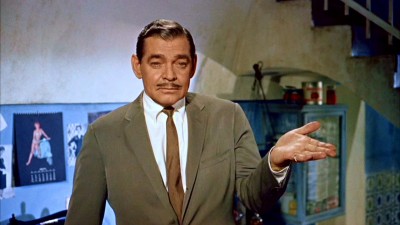
Ex-serviceman and upright Philadelphia lawyer Michael Hamilton (Clark Gable) is returning to Naples, Italy, to belatedly settle the estate of his estranged brother, Joseph...and by "settle" Mike means getting back the $14,000 dollars he lent his ne'er-do-well brother over the years. His Italian contact, attorney Mario Vitale (Vittorio De Sica), when he's not ogling every pretty girl that passes by, informs Michael that not only was irresponsible, very married Joseph shacking up with the Italian woman who drowned with him in a boating accident the year before, he was also the father of an illegitimate son, Nando (Marietto), now eight years old and being taken care of by the mother's sister, Lucia Curcio (Sophia Loren). Suspicious that he might be set up for a scam, Mike wants proof that Nando, who resides with Lucia on the scenic tourist attraction island of Capri, is his nephew--a fact confirmed when Mike sees dirty, hustling Nando wolf-whistle at a pretty girl ("Welcome to the family,"). When Mike first meets Lucia, she claims to be rich, but he soon discovers she's actually a singer/dancer at a rowdy nightclub, living in relative (but happy) poverty. She fears Mike will take Nando away to America, but Mike--simply out of a sense of duty--has no interest in providing anything more than monthly cash payments for Nando's upkeep; he's leaving Italy that night, to be married in Philly the next day. However, when Mike sees little Nando, at one in the morning handing out "dirty" pictures of his aunt, advertising her act, and realizes the little kid doesn't even go to school, he decides Nando should go to the American School in Rome, where he'll have a chance to be more than a menial laborer. Soon, Mike decides that perhaps he should have full custody of Nando...and voluptuous Lucia, as well (or at least temporarily).
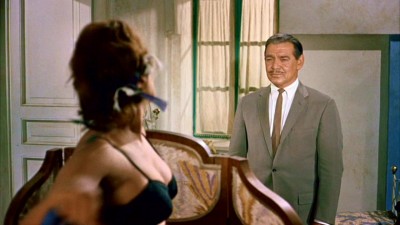
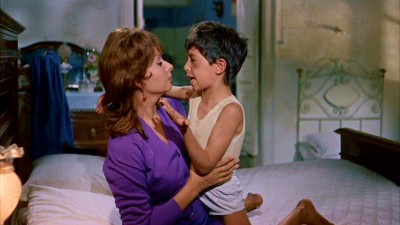
Known today primarily for the timing of its August, 1960 premiere here in the States--the last movie released during Gable's lifetime, just three months prior to his fatal heart attack in November, 1960--It Started in Naples was a nice little earner for both stars at critical junctures in both their careers--late summer ticket buyers embraced it, even if the critics were politely dismissive. Italian bombshell Loren, after an initial hit-and-miss splash in Hollywood (her debut, Stanley Kramer's The Pride and the Passion, sold tickets in 1956, but Jean Negulesco's Boy on a Dolphin flopped), was coming to the end of a seven-picture deal with Paramount that had yielded only one certifiable hit--Houseboat, with Cary Grant--among a worrying string of flops: Desire Under the Elms, The Black Orchid, That Kind of Woman, Heller in Pink Tights, and A Breath of Scandal (side studio projects Legend of the Lost and The Key faired no better at the box office). Prior to It Started in Naples' premiere, Loren's future as an international movie star--rather than just another Italian publicity sensation washed out in Hollywood--was far from a certainty. As for her leading man, Clark Gable, he was finally negotiating the uncertainties of freelance moviemaking, after having left his home studio of more than 20 years, M-G-M, in 1954. His last big, big hit had been for Metro (1953's Mogambo), but subsequent projects--while financially successful for the mature star, who was finally in a position to negotiate hefty up-front fees--were far less popular with his loyal but dwindling cadre of fans (his first freelance effort, Soldier of Fortune, made a small profit, but The Tall Men, The King and Four Queens, Band of Angels, and Run Silent, Run Deep, all eventually lost money). Immediately prior to It Started in Naples, Gable had had a sizeable success with Doris Day in Teacher's Pet in 1958, which led to a two-picture commitment to Loren's studio, Paramount. His first effort, But Not for Me, a romantic comedy with Carroll Baker, was an embarrassing flop, leading an aged-beyond-his-years Gable to publically announce--after snickers from critics and the public--that he would no longer romance young women on the screen...a notion quickly abandoned when he agreed to Paramount's attractively-packaged It Started in Naples (not only was the pedigree good--Loren, producer Jack Rose, and director Melville Shavelson, the creative team behind her past Paramount hit, Houseboat, but a three month all-expenses-paid vacation in Italy for Gable's wife and stepkids wasn't exactly an ordeal, either).
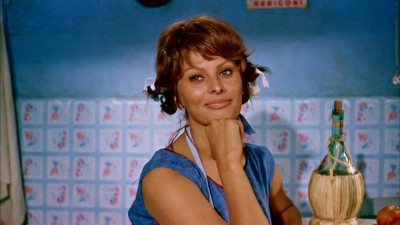
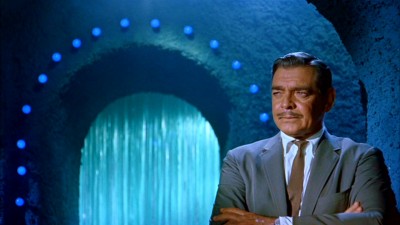
Five writers are credited with It Started in Naples's script (a potential red flag right there): screenwriters Jack Rose (Road to Rio, The Seven Little Foys, A Touch of Class), Melville Shavelson (The Five Pennies, The Pigeon That Took Rome, Yours, Mine and Ours), and Suso Cecchi d'Amico (the legendary Italian screenwriter who worked on everything from Senso and The Leopard, to Big Deal on Madonna Street and The Bicycle Thief), from Michael Pertwee's (episodic TV like The Saint and Danger Man) and Jack Davies' (Doctor at Sea, On the Beat, Those Magnificent Men in Their Flying Machines) story. In terms of traditional romantic comedy conventions, It Started in Naples certainly isn't surprising in terms of structure or execution. As with other American sex comedies of the time still limited by self-censorship considerations, the sexual undertones of the storyline are discreetly hinted at, and no more. Gable's opening narration, as a successful American businessman seeing Italy again after having spent WWII there, sets an initial cynical, condescending tone for the movie that distills his wartime experience of Italy down to prostitutes and black market thieves (as he spies two hookers on the train platform, he cracks to us, "Hi, girls...I think I knew your older sisters. One of them has my good conduct medal,"). However, he's shown now to be a slightly stuffy, provincial Philly lawyer just about to be married, so no hookers sent to his room on this trip. De Sica's Italian lawyer character seems incapable of keeping his eyes off any woman's rear that passes by, including friend Sophia's, but his lechery is played strictly for laughs, with no contact made whatsoever (De Sica's gallant air masking his uncontrollable sex drive only heightens these laughs). Marietto's illegitimacy is "paid for," Code-wise, by having his unmarried mother and father drowned before the movie starts, while the question of how Sophia earns her money is settled when Gable anonymously tries to "buy her" for the night--a gag she goes along with because she's tipped off to Gable's secret participation. As for her own sex life, apparently (and improbably) it's chaste...despite being such a famous object of desire on the island. It Started in Naples may feint at being naughty, but it plays even "safer" than any Doris Day sex comedy of the day.
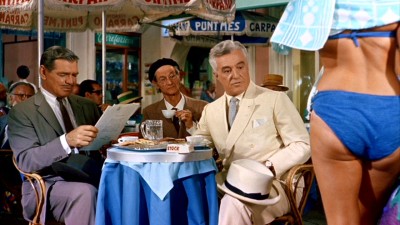

As for It Started in Naples' overt digs at Americans and their way of life, they're just as toothless as the story's sex elements...and a lot dopier. By 1960, Italy had been experiencing very real and painful cultural friction between its ages-old customs and an ever-encroaching American pop culture. It Started in Naples uses this complex societal collision for nothing more than some easy, cheap jokes...and mostly at America and its citizens' expense. If you're looking to be offended by these put-downs, however (which I always am...), don't bother here, because the insults are facile and soft, and poorly grounded anyway (and further ameliorated by the heady fizz of the VistaVision Italian scenery and the frequent display of Loren's bountiful, insane body). It's easy to "side" with the Italians here because their way of life, as shown, is pure cinema fantasy (who wouldn't want to lay around the island of Capri, eating pasta and nailing Sophia Loren every day, without a care--or a job--in the world...because you're already a rich lawyer who looks and acts like Clark Gable?). We don't see the real negatives of being poor and uneducated in Italy; we're just told at the end of the movie that the Italian way of life is somehow better because Americans are somehow worse (I love it when an anonymous Italian yells at Gable for America to get out of the Middle East--a gratuitous, irrelevant political shot that seems even more bizarre coming out of a movie with absolutely nothing on its mind).
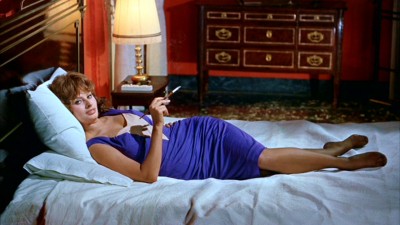
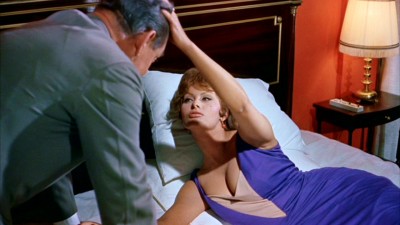
But what's "worse" about Americans in It Started in Naples? Your guess is as good as mine, because the script just assumes we already know what's wrong with American culture. The most specific It Started in Naples gets about why Nando must not go to America, is that we Americans make our kids go to bed early, wake up early, and go to air-conditioned schools wearing factory made shoes so that they can get better jobs than we parents have (jesus christ someone call The Hague's war crimes tribunal...). Gable's sardonic view of Italy as a country of carefree, indolent, good-natured chiselers is supposed to set him up as culturally intolerant, punctuated at the movie's finale by hearing the obnoxious American tourists on the train. That's when he finally realizes SPOILERS ALERT! that go-getting Americans are awful and Nando should stay in Italy, because somehow the love of the poor and uneducated is more real in Italy than in America (contemplating a school-less Nando growing up to do unthinking donkey labor, Gable states, "Maybe pushing that cart up a hill isn't so bad,"--a real hoot for those who know all too well what romanticized bullsh*t that is). Forget the fact that the movie stacks the deck with those horrible tourists (the supposed pervasiveness of the "ugly American" tourist is something self-loathing Americans love to trot out): it's tough to take Loren's and De Sica's indignation over these supposed slights by Gable and other American tourists seriously, when so many Italian comedies themselves used this stereotypical view of the physically and morally laid-back, casually criminal Italian culture, as comedic fodder. What could have been a source of genuine comedic tension--that clash between American and Italian lifestyles--is nothing more than trite, facetious posturing and generalizations in It Started in Naples.

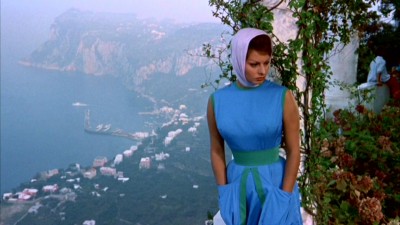
Oh, well...at least Sophia Loren's body is prominently featured. That sounds flippant, but you're crazy if you don't think that's a big part of It Started in Naples' appeal (as well as, thankfully, her expert comedic timing). Aside from the dazzling location shooting and rather remarkable color design by color consultant Hoyningen-Huene and cinematographer Robert Surtees (which must have looked stunning in projected VistaVision), It Started in Naples' strongest suit are the performances by the four leads. Marietto and De Sica vie for It Started in Naples' chief scene stealer, with the results a delightful draw. Marietto, an instantly hilarious little charmer, gets big laughs screaming in Italian at Auntie Loren, while De Sica put me on the floor, groaning, "We're all born to sufferrrrrrr!" in pained ecstasy as a sexy girl walks by his table. Gable, top-lined here, looks far older than his mere 58 years, but no matter how much his weight noticeably balloons up and down, or how much his thick hands noticeably shake, his grizzled charm and unerringly correct line readings, mixed in with all the iconography of his then already legendary status, makes you instantly root for him. It's yet another Hollywood variation on the confident, assured, good-humored, sexy, essentially kind--and surprisingly wistful--mid-century American male that was systematically and mercilessly ridiculed and lampooned over the next few decades, and eventually completely eradicated from our collective pop culture. As for that force of nature Sophia...what could I possibly write that hasn't already been written about this actress? Saying she looks "at her peak" here is dead wrong because she always looks "at her peak," but there's no denying a full lushness to not just her body but to her spirit, as well, that's devastatingly attractive (don't even get me started about her musical numbers here). If that corporal pull was all Loren had to offer, if would still have afforded her a formidable legacy. But watching her more than hold her own with an icon like Gable, pulling off sly, knowing double-takes while switching instantly from broad physical comedy to dreamy romantic swooning, you don't get the feeling you're watching a relative newcomer (in a language foreign to her, no less), but rather a seasoned pro not at all perturbed about acting with a legend who could have blown her off the screen. It's a delightful performance that's as skilled as it is funny (as well as touching, when she's with little Marietto). It's just too bad all these pros were in service of a such a misguided piffle of a movie.
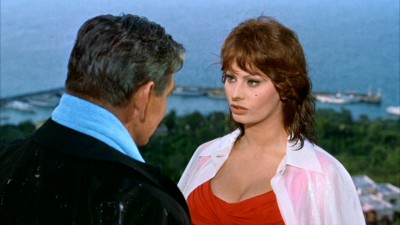
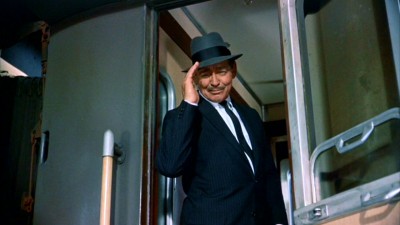
The Video:
Terrific. The anamorphically-enhanced, 1.85:1 widescreen transfer for It Started in Naples is brilliantly colored, with a sharp, detailed image and few if any imperfections. Edge enhancement is acceptable. Very nice.
The Audio:
The Dolby Digital English mono audio track is serviceable, with little hiss. No subtitles or closed captions available.
The Extras:
No extras.
Final Thoughts:
The only possible message from Italy I'm interested in is that Sophia's outside, waiting in a limo for our dinner date (...and that she's working up a full head of Italian steam over my naughty tardiness). Other than that, stick to the comedy and romance. Better yet: if you're going to go for humor derived from a culture clash between outdated, stereotypical prudish American go-getters and joyous Italian layabouts, can you make the jokes smarter? Excellent performances and incredible Italian scenery courtesy of VistaVision, are It Started in Naples' saving graces, and they're enough to recommend it to receptive viewers.
Paul Mavis is an internationally published movie and television historian, a member of the Online Film Critics Society, and the author of The Espionage Filmography.


|
| Popular Reviews |
| Sponsored Links |
|
|
| Sponsored Links |
|
|
| Release List | Reviews | Shop | Newsletter | Forum | DVD Giveaways | Blu-Ray | Advertise |
|
Copyright 2024 DVDTalk.com All Rights Reserved. Legal Info, Privacy Policy, Terms of Use,
Manage Preferences,
Your Privacy Choices | |||||||











